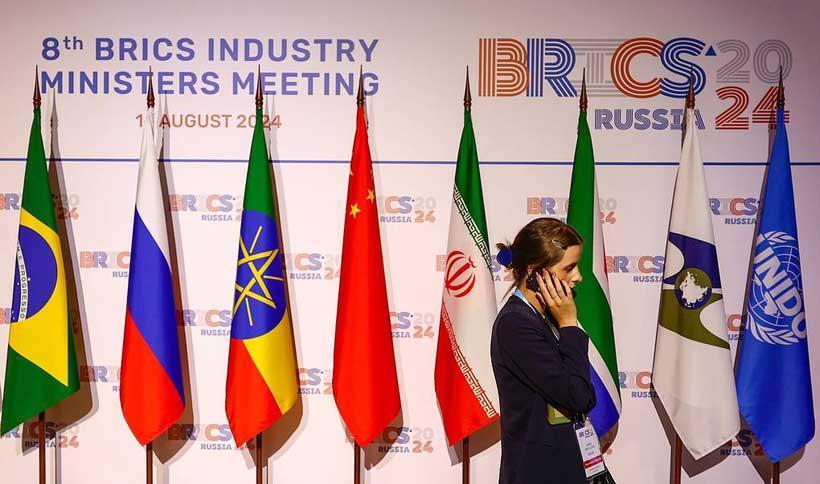By
Irmanita Safitri
Africa-Press – Lesotho. States no longer employ war as a tool to achieve their goals. Preferring to utilize more peaceful methods, states employ it to pursue highly consequential objectives. BRICS serves as a manifestation of this notion. The emergence of BRICS increasingly challenges the Global North. The establishment of this cooperation reflects the efforts of the Global South to alter the global order and break free from the long-standing dominance of the Global North.
BRICS represents more than a symbol of cooperation. It is actively engaged in a geopolitical chessboard that shapes today’s global economy. Gradually yet steadily, it is shifting the global balance of power through the strength it has accumulated. This is evident in the growing interest among developing countries to join the group.
Led by two major powers perceived as threats to the Global North, China and Russia hold substantial leadership roles. China dominates the global economic landscape and poses a challenge not only to the United States but also to Europe. The European Union consistently asserts that China is a rival in the renewable energy sector, particularly in electric vehicles. Russia, on the other hand, holds significant energy leverage over Europe and poses a geopolitical challenge to NATO, which is led by the United States. The development of this cooperation is further reinforced by the accession of strategically significant global actors such as Iran and the United Arab Emirates, with their vast oil reserves; Ethiopia, with its port access; and Egypt, with its strategic geographic position in relation to the West.
The inclusion of these countries further destabilizes the seemingly absolute dominance of the Global North.
Power has long been synonymous with the realist approach, which is grounded in strength.
However, the definition of strength and power has evolved. Power is no longer solely defined in terms of military capability or weaponry. In today’s global context, power is also measured by a state’s influence in shaping the rules of the game. Cooperation serves as the foundation of this new form of power.
BRICS leverages this expanded notion of power and influence. It builds coalitions to undermine dominance not by overt force, but by subtly shifting the balance—leaving its opponents unaware that a transformation is underway. BRICS undoubtedly presents a substantial challenge to the Global North’s dominance. In response, Western countries have adopted equally measured diplomatic strategies aimed at undermining BRICS from within.
During a G7 summit, former U.S. President Donald Trump expressed regret over Russia’s removal from the G7 following its annexation of Crimea in 2014.
“I would say that was a mistake, because I think you wouldn’t have a war right now if Russia were still in, and you wouldn’t have a war right now if Trump had been president four years ago.”
Trump also did not object to the possibility of China joining the G7, stating:
“Well, it’s not a bad idea. I don’t mind that. If someone wants to suggest China joining, I think we should suggest it, but you want people you can talk to,” he added.
At first glance, these remarks appear to suggest a constructive approach to U.S.–China relations. However, upon closer examination, they may be interpreted as part of a broader strategic effort to weaken U.S. involvement in China’s global agenda.
This statement illustrates the extent to which the Global North powers are monitoring and responding to the actions of two principal BRICS members—China and Russia—as part of their efforts to undermine alliances among the Global South countries. Beyond these two core members, the G7 extended invitations to three strategically important BRICS countries—India, South Africa, and Brazil—to attend the forum as guest participants. This move represents a calculated geopolitical effort by the Global North to engage selectively with the Global South actors on the international stage.
In early July 2025, BRICS convened a summit in Rio de Janeiro, Brazil, from 6–7 July. The summit was attended by all member states, including Indonesia as the newest addition to the group. Amid widespread global instability, the summit focused on pressing international issues, particularly those concerning the global economy and sanctions imposed by the United States. The meeting also addressed and condemned the Israel–U.S. military action against Iran, characterizing it as a violation of international law. These discussions served to foster a shared perspective and unity among BRICS members, with the expressed objective of challenging and dismantling systemic dominance.
The global chessboard, once governed exclusively by the most powerful Global North actors, is now being gradually redefined by emerging powers. These new actors, having grown weary of external direction, are seeking to establish their own platforms for influence and victory.
In conclusion, cooperation may serve as a strategic instrument for gaining power—one that cannot be easily condemned by any state. It represents the power to shape a new world order. Moreover, cooperation can also function as a tool for existing powers to engage with emerging actors and potentially undermine them from within the very system those new actors have established. Thus, cooperation in this context is not merely a symbol of unity but a form of conflict—one that is waged without conventional weaponry or the noise of warfare, yet still aimed at securing or contesting global dominance. Whether that dominance is preserved or overtaken remains the central struggle.
moderndiplomacy
For More News And Analysis About Lesotho Follow Africa-Press






